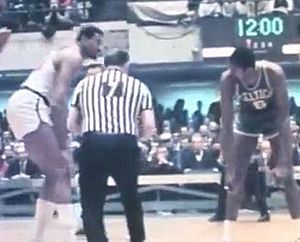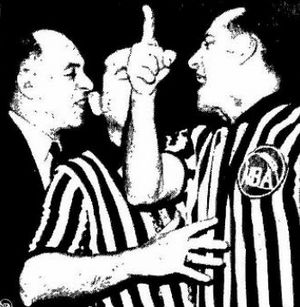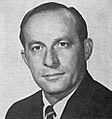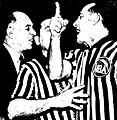Norm Drucker facts for kids
Quick facts for kids
Norm Drucker
|
|
|---|---|
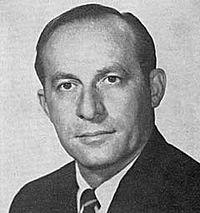
Pictured 1969
|
|
| Born | July 4, 1920 |
| Died | February 6, 2015 (aged 94) |
| Nationality | American |
| Occupation | NBA referee (1953–1969) and (1976–1977), NBA Supervisor of Officials (1977–1981), ABA referee (1969–1976), ABA Supervisor of Officials (1969–1974) |
| Spouse(s) | Shirley |
Norm Drucker (born July 4, 1920 – died February 6, 2015) was a very important person in professional basketball officiating for over 35 years. He worked as a referee and supervisor in both the NBA and the ABA. During his long career, he saw many famous players like Wilt Chamberlain, Jerry West, Bill Russell, Julius Erving, Larry Bird, and Magic Johnson.
Contents
A Long Career in Basketball Officiating
Norm Drucker was born in New York City. He started working as a referee for the NBA in 1953. By the early 1960s, he was often chosen to referee important games in the NBA Finals.
In 1969, Norm Drucker took a big chance. He left the NBA to join the newer ABA. Three other top NBA referees also joined him. Their contracts were the first multi-year deals for referees in professional basketball.
A Referee's Salary and Impact
Norm Drucker was so respected that his salary, plus a $25,000 bonus, was more than double what an average NBA player earned back then. This made him the highest-paid referee in basketball history at that time! Because of this, other professional referees also saw their salaries go up.
This change helped officiating become a full-time job with better working conditions. It also made people respect referees more.
In the ABA, Norm Drucker not only refereed games but also helped supervise other officials. When the ABA and NBA merged in 1976, he was one of the few ABA referees chosen to return to the NBA.
He retired from refereeing after the 1976-77 NBA season. He had officiated for 24 seasons in a row, which was a record at the time. He refereed 6 All-Star Games and 38 championship round games.
Fairness on the Court
Norm Drucker was known for being fair to all teams, even the visiting ones. This was special because some referees were criticized for favoring the home team. He once said he enjoyed making calls against the home team, standing alone against the crowd.
For many years, from 1963 to 1977, Norm Drucker, along with Mendy Rudolph and Earl Strom, were considered the best referees in professional basketball.
Norm Drucker often refereed the most important games. He officiated the final, deciding game of league championships eight times. This is a very high number, showing how trusted he was.
He was also known for making tough calls, even against famous players. He is the only referee to ever eject Wilt Chamberlain from an NBA game! This happened on January 3, 1962, when he called three technical fouls on Chamberlain.
He also had a famous "feud" with legendary Boston Celtics coach Red Auerbach. Norm Drucker once ejected Auerbach from a game, which led to the coach being suspended for three games.
Witnessing Basketball History
Norm Drucker's career gave him a front-row seat to many important moments in NBA history. He was the last active NBA referee who had worked in the 1953-54 season. This was the last season before the NBA added the 24-second shot clock, which changed the game a lot.
He was also part of a special game that experimented with 12-foot high basketball rims instead of the usual 10-foot ones. He was on the court when Bob Pettit scored his 15,000th career point and when Wilt Chamberlain scored his 25,000th.
He officiated the very last game in the history of the ABA in 1976. He also refereed Bob Cousy's final game as a Boston Celtic and Red Auerbach's last game as a coach.
Norm Drucker also connects different generations of referees. He worked with referees who started in the NBA's first season in 1946-47. Later, as a supervisor, he hired Joe Crawford, who refereed until 2015-16.
Improving Referee Conditions
Norm Drucker cared a lot about making things better for future referees. In 1977, he and most other NBA referees went on strike before the playoffs. Even though he was 56 and about to retire, he joined the strike. He knew he wouldn't benefit directly, but he wanted to help younger referees get better pay and working conditions.
After 16 days, the strike ended, and the NBA officially recognized the referees' union for the first time. Within three years, top NBA referees saw their salaries and benefits increase a lot.
Even after the strike, the NBA hired Norm Drucker as its Supervisor of Officials. He supervised and trained other referees for 10 seasons. He helped improve NBA rules and the quality of officiating.
New Rules and Training
As the NBA's Supervisor of Officials, he was one of the first to suggest adding the ABA's three-point shot to the NBA. The NBA adopted the three-point shot in 1979. He also pushed for using three referees per game, which the NBA eventually adopted permanently in 1988-89.
He also created the first official training program for professional basketball referees. This program helped select and train new referees in the minor leagues. Many successful NBA referees came from this program. Today, training in minor leagues is a normal part of becoming an NBA referee.
Norm Drucker also started using psychological tests for referees. He wanted to understand what personality traits made a great referee. One finding was that great referees "love basketball" to succeed.
After he retired as a supervisor, the NBA honored him in "Legends" Games. These games featured retired NBA stars. In one game, he even gave his old rival, coach Red Auerbach, a technical foul, which made everyone laugh!
Early Life and Playing Career
Norm Drucker's basketball journey began as a player. He played high school basketball at Erasmus Hall High School in Brooklyn starting in 1937. Back then, the game was different: there was no 3-second rule, and a jump ball happened after every basket.
He played college basketball at City College of New York (CCNY) under famous coach Nat Holman. His 1941-42 CCNY team, which included future New York Knicks coach Red Holzman, was ranked third in the country.
In 1943, World War II interrupted his college career. He served in the U.S. Army for three and a half years in Europe. After the war, he played professionally for the Troy Celtics and the Trenton Tigers, winning a championship with the Tigers in 1946-47.
In 1949, Norm Drucker started his officiating career. He refereed games at different levels before joining the NBA full-time in 1953. In 1989, he came out of retirement to supervise officials for the World Basketball League, a minor league.
Awards and Family
Norm Drucker was recognized for his contributions to basketball. He was inducted into the CCNY Athletic Hall of Fame in 1986. In 1994, he joined the New York City Basketball Hall of Fame, and in 1998, the National Jewish Sports Hall of Fame.
His son, Jim Drucker, also had a career in sports. He was the commissioner of two professional sports leagues, the Continental Basketball Association and the Arena Football League.
Norm Drucker passed away in 2015 in East Norriton, Pennsylvania.
Images for kids
 | Janet Taylor Pickett |
 | Synthia Saint James |
 | Howardena Pindell |
 | Faith Ringgold |


